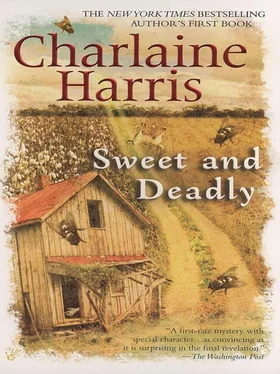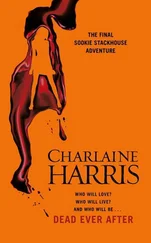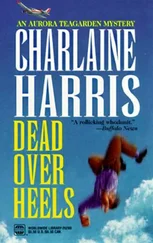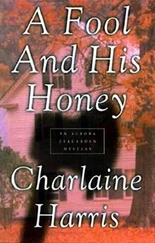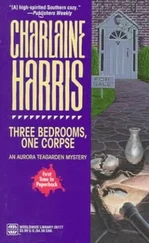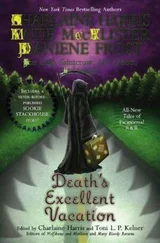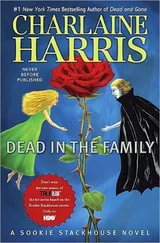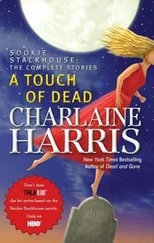But Randall was there. When she came through, she would have a tenuous something at the other end. She hadn’t had that before, and she had made it then. She would make it again. This time, if she won decisively, it might never happen again, she thought.
The police were gone. Angel was gone, after telling Randall without a twitch of an eyebrow that he would be staying with Catherine that night.
Only Randall and Catherine were left in the house, and it seemed empty with just two inhabitants, after the coming and going it had seen that evening.
In the house out back, there was fingerprinting dust, bloodstains, and silence. The blood, Tom’s blood, would be dry now, and brown. Catherine could feel the presence of that house at her back. She wondered what she would do with it, the old house that had seen so many uses in its long life. Who would want it now?
Randall had gone to get the Mascalcos’ telephone number after a long, quiet, tense discussion with Catherine. He had not wanted to wake the Mascalcos with the news that their son was dead. He had wanted to wait until morning. Catherine had only thought they had a right to know as soon as possible. It couldn’t be withheld from them, she had argued. They would bitterly resent being called in the morning and learning their son had been dead for twelve hours.
Catherine had not learned of the death of her parents until she had gone back to her new apartment from her new job. She remembered the guilt she had felt at having been happily engaged in something else while their corpses were in a little funeral home in Arkansas. She remembered her anger that others had known the news, more important to her than to anyone in the world, hours before she was told.
Randall had yielded to her argument. She could hear his voice in the kitchen now.
But she realized, as she huddled in her corner of the couch, that she should have said nothing to Randall, nothing at all. He, not Catherine, was the one who had volunteered to break the news. She should have left it up to him, since he had taken on the sickening responsibility.
She listened to the murmur of his voice and felt furious at her own interference. Her capacity for anger with herself was far greater than her capacity for anger with anyone else.
When Randall returned to the den, his face was gray with strain. He removed his glasses and rubbed the bridge of his nose. When he finally spoke, it was not about the conversation that had just taken place.
“Catherine, take off those goddamned clothes,” he said.
She gaped at him.
Then she understood. She rose without a word. In the bathroom she yanked off the bloodstained jeans and jammed them into the garbage can. She looked down at herself and saw that the blood had soaked through her clothes and dried on her skin. She stepped into the shower and soaped and rinsed, then repeated, until her hands and legs were white again and chafed with scrubbing.
Tom’s blood, down the drain. Four people, down the drain. Gone. Snuffed out like dogs hit by careless cars, because they were in the wrong place at the wrong time; because they weren’t aware of the danger until it was too late.
Randall would hire a new reporter. He would doubtless start looking the next day.
Jerry Selforth was prescribing antibiotics and setting broken arms, just as Dr. Linton had done for years. He had a nurse who managed his office just as well as Leona would have. And Molly Perkins held the coffees for the bridge club every bit as well as Rachel Linton had.
Other dun-colored dogs were running through the fields, coupling with bitches to ensure more dun-colored dogs.
That was the way life went on. The thought might even be comforting, after a few years. Many years. More years than I will live, she thought.
She sprayed herself with perfume, thinking the smell of Tom’s death was still on her, and went out to join Randall.
He seemed to have recovered from the worst of his conversation with the Mascalcos. But for the first time, Catherine was fully conscious that he was twelve years older than she was. He had gotten out his pipe and was puffing away, looking more than ever like a muscular, misplaced professor.
“Can you sleep now?”
She shook her head.
“Neither can I. Let’s go over it, if you can stand that.”
She waited. She owed him this, for having urged him to call the Mascalcos.
“Leona. No-your parents. The first ones.”
A fire ignited in her tired body. He accepted her conviction. He agreed.
“Your mother. Your father. His nurse. A reporter who said he was going to pry into their murders. This started with your folks. Glenn or Rachel, as the primary target?”
“I think…my father.”
“I agree. Something he knew as a doctor.”
“Not necessarily,” she said. “He was a friend to half the county, and he inspired confidences.”
“Granted.” Randall knocked his pipe out in an ashtray. “Do you think Leona could have killed your parents? Could she have been a murderer? How did she feel about your father?”
“Before she was a blackmailer and an abortionist, she was a good nurse for my father for thirty-odd years,” Catherine replied. “There was never anything between them, but I think Leona loved my father. I can see that now…Maybe I knew it all along.”
“Do you think she could have killed him, knowing she couldn’t ever have him?”
“I don’t think so. I think she was used to the companionship she had with him every day at the office. She would have been his nurse until he retired, and that was years away. And she lost her income when he died: Leona loved money, too. Last point, but not least, I don’t think she knew how to tamper with a car.”
“That’s disposed of, then.” Randall had tidied that argument away. Catherine realized that in his own way he was working off the grief and horror of Tom’s death.
“So,” he muttered, “we assume that Leona didn’t kill your parents. Do we take for granted, then, that Glenn, Rachel, and Leona were killed by the same person, for the same reason?”
Sure, why not? Catherine thought crazily. She nodded.
“Okay. That would point to something they all knew. Considering the six-month lapse between murders, it would seem that for six months Leona kept silent about something she knew, while the murderer paid her blackmail money. Something Leona discovered after your father was killed, maybe when she got the office wound up…Or maybe she realized the significance of an event or a conversation later. Something your father knew in his professional life; or something told to him in the office, as a friend.”
Catherine mulled that over.
“I didn’t express that well. Too many ‘somethings’ and ‘maybes’…But do you agree?” Randall prodded.
Finally Catherine nodded. “Leona was always at the office when my father was there,” she said slowly. “Even when someone buzzed him late at night”-she shuddered-“he would call her to come in before he even went over there. So she would have heard everything he heard, unless the conversation took place after he sent her from the room, while he talked with a patient after an examination. He would do that so she could prepare for the next patient, or pull files on whoever was in the waiting room. And all the files were accessible to her.” Catherine stopped to think. “But with something like this, Randall, I can’t imagine…We’re presuming a critical conversation, a very personal and important conversation. Father would have sent Leona from the room. I know. He always knew when people were embarrassed or self-conscious about what they had, or suspected they had. His consultations with them were always private.”
“Couldn’t she have listened at the door?”
“It would have been hard. There were always other patients around, and the office maid, and the receptionist.”
Читать дальше
